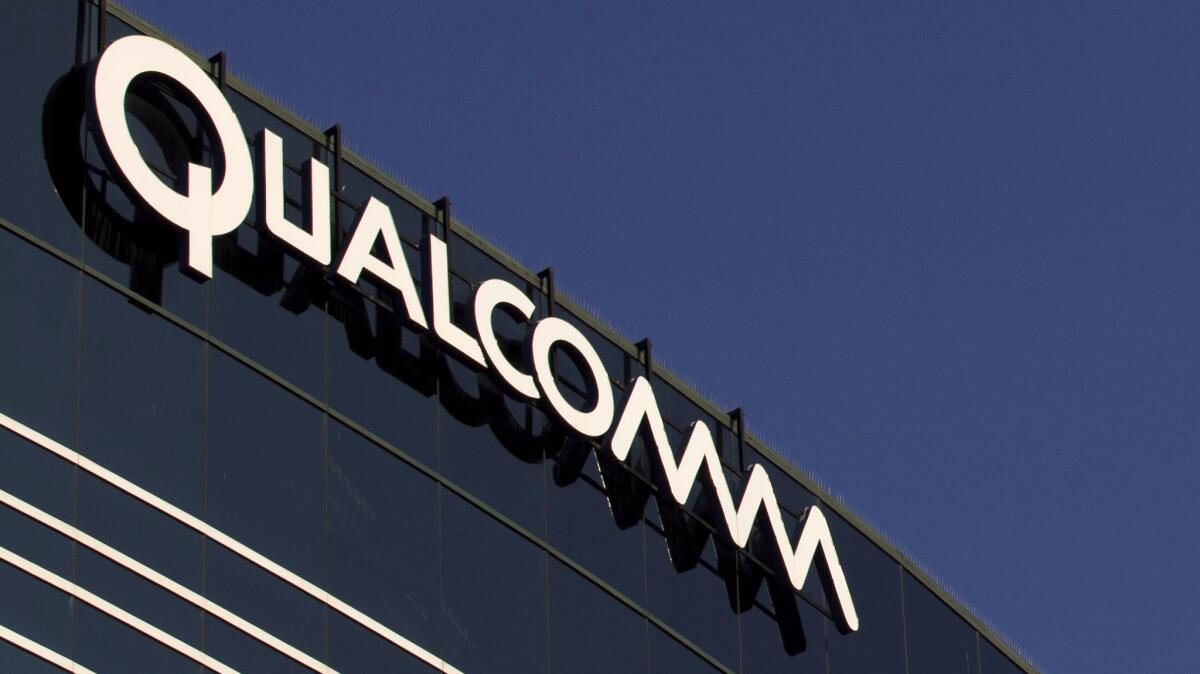Qualcomm gets into chips for computer servers, challenging Intel’s stronghold

Qualcomm is taking the wraps off its two-year effort to build computer server chips, challenging Intel’s stronghold in the fast growing data center market.
The San Diego smartphone semiconductor giant said this week that its new server chip, called Centriq 2400, is now being tested with key customers and is expected to be commercially available in the second half of 2017.
Qualcomm Technologies Inc.’s foray into server chips is a potential threat to Intel’s most profitable business, highlighting how the two rivals are increasingly squaring off in the core markets that each dominate.
This fall, Santa Clara, Calif.-based Intel Corp. won a cellular modem slot in some Apple iPhone 7 models, displacing Qualcomm on AT&T’s and T-Mobile’s networks.
It was Intel’s first significant win in mobile, lending credibility to its long-sought smartphone ambitions. Qualcomm retained Apple’s cellular business on Verizon and Sprint in the U.S., as well as in China.
Two years ago, Qualcomm announced it had started work on chips for data centers — office buildings full of connected computer servers that power the Internet cloud, big data analytics and other things. Qualcomm tapped its expertise in low-power, system-on-a-chip designs from mobile to give server makers an alternative to Intel.
Qualcomm said Wednesday that its new server chip — based on architecture licensed from ARM Holdings — has multiple processing cores. It’s being manufactured using the most advanced semiconductor process technology.
“Qualcomm is really going to set the bar for ARM server chips,” said Jim McGregor, principal analyst at Tirias Research. “It is a huge company. You know they are going to stay in it. You know they have the resources to compete.”
Qualcomm declined to name customers or what semiconductor maker would build the chips using 10-nanometer process technology.
“That means it is a leading-edge chip,” said McGregor. “Typically server chips are one or two generations behind in process technology because they are so large and so complex.”
Intel is currently in volume production at 14 nanometers for server products, said William Moss, a company spokesman. It expects to launch its first 10-nanometer product in the second half of 2017.
“We operate in a highly competitive market and take all competitors seriously,” Moss said in an email. “There has been a lot of hype about ARM in the data center for several years, but very few deployments.”
Incompatible software has been part of the problem for ARM-based semiconductors, according to analysts. But increasingly today’s top data center software will work on Intel’s architecture as well as ARM designs.
Qualcomm said it has demonstrated its Centriq 2400 processor running Apache Spark and Hadoop software on Linux and Java platforms.
Cavium, Advanced Micro Devices and a handful of other semiconductor firms make ARM-based server chips for data centers. Intel builds data center chips based on a different, PC-based architecture.
Qualcomm didn’t disclose power/performance benchmarks for Centriq 2400. A spokeswoman said the metrics would be available later. Although it used ARM’s instruction set, Qualcomm said it custom designed the CPU and other features in the new chip.
“We believe our Qualcomm Centriq family of server processors will bring the right differentiated value to customers,” Anand Chandrasekher, senior vice president of Qualcomm Datacenter Technologies, said in a statement.
Freeman writes for the San Diego Union-Tribune.
mike.freeman@sduniontribune.com






